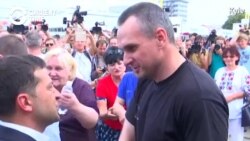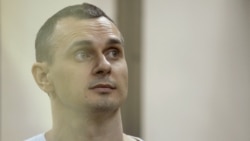Ukraine and Russia on September 7 completed a long-awaited exchange of 70 Russian and Ukrainian prisoners. Ukrainian President Volodymyr Zelenskiy called the exchange “the first step” in a process that will continue with the return of Russia-annexed Crimea and the breakaway Donetsk and Luhansk regions to Ukrainian control.
“We will return not only our people, but also our territories,” he said at a news briefing at Kyiv’s Boryspil airport upon the 35 Ukrainian prisoners’ arrival.
Zelenskiy, who ran for election this spring with the promise to return Ukrainian prisoners from Russia, stood at the foot of the plane’s stairway, shaking hands with and embracing each of the returnees.
He told reporters that Ukraine ultimately “will get the return of all of our prisoners of war” and continue with both the Minsk and Normandy formats for negotiations with Russia over the conflict in eastern Ukraine.
Filmmaker Oleh Sentsov and all 24 Ukrainian sailors captured during a 2018 naval clash off the Crimean Peninsula were among the 35 Ukrainians Russia returned to Ukraine.
In emotional reunions with waiting relatives on the tarmac, they displayed joy and relief at their homecoming.
“We survived,” said a smiling 63-year-old Oleksei Sizonovych, the Ukrainian flag draped across his shoulders. A Russian court in 2016 sentenced Sizonovych, a resident of the breakaway Luhansk region, to 12 years in prison for allegedly preparing a terrorist act, illegally crossing the Russian border, and for the supposed possession of explosives.
“I never thought I’d stay there,” said Sizonovych. “I always thought that I’d return home.”
Sentsov, 43, commented, however, that "[e]ven with the release of the last prisoners, our struggle [for the liberation of occupied Ukrainian territory] does not end."
Russia sentenced the documentary filmmaker, a resident of Crimea, to a 20 year term in 2015 for allegedly planning terrorist acts – a charge widely condemned by the international community as retaliation for his condemnation of Russia’s 2014 annexation of the Ukrainian peninsula.
“[V]ictory is still far off," he said to reporters.
A grim-faced 21-year-old Pavlo Gryb, the youngest of the prisoners, told reporters the prisoners had been asked to write a request for pardon when they were transferred to Moscow’s Lefortovo detention center prior to their departure. “I said, ‘Why should I write this?’ And they said, ‘Go ahead and write it.’”
Gryb, a blogger who was sentenced to six years in prison this March for allegedly assisting terrorism, called the request “a technical document." Some of the prisoners requested a pardon; others did not, he claimed.
Interviewed prisoners appeared still to be processing the sudden change in their circumstances. Sailor Yevhen Semydotsky said Russian prison officials had given no advance warning of the exchange until telling him at 4 a.m. on September 7 to gather his things.
“I need time to adapt . . . You know, this was a difficult path and I need time,” he said.
All 35 Ukrainians will undergo a hospital evaluation of their medical condition.
The Ukrainian president’s office has published a full list of all those Ukrainians released.
Kremlin spokesman Dmitry Preskov stated that Moscow would later release a list of the Russian prisoners returned by Ukraine.
Among those known to have been exchanged is Volodymyr Tsemakh, a “person of interest” in the international investigation into the 2014 shooting down of Malaysian Airlines Flight 17. Tsemakh, a former air-defenses commander for separatist forces in the breakaway region of Donetsk, was released from prison in Kyiv on September 5, pending trial on charges of organizing a terrorist group.
International investigators into the MH17 crash were able to question Tsemakh before his departure for Russia, President Zelenskiy said, adding that he had been afraid that the question of Tsemakh's testimony might disrupt the prisoner exchange.
The Dutch government, nonetheless, stated that it “seriously regrets that under pressure from the Russian Federation, Mr Tsemakh was included in this prisoner swap," Reuters reported.
Another high-interest prisoner, Kirill Vyshninsky, the Kyiv bureau chief for Russia’s state-run RIA-Novosti news agency, was met at the airport in Moscow by the agency’s director, Dmitry Kiselyov, who helped wheel his suitcase to a bus.
Unlike the Ukrainian authorities, Russian officials did not grant all media access to the airfield at Moscow’s Vnukovo-2, where a state plane bearing the 35 Russian prisoners landed. The state-run RT provided a live feed of their arrival, with other outlets left outside the airport gates.
The Russian embassy in Ukraine, however, tweeted a photo of the released prisoners before their departure from Kyiv.
In a September 5 remark to reporters, Russian President Vladimir Putin called the exchange “a good step ahead toward normalization” of relations with Ukraine.







Facebook Forum